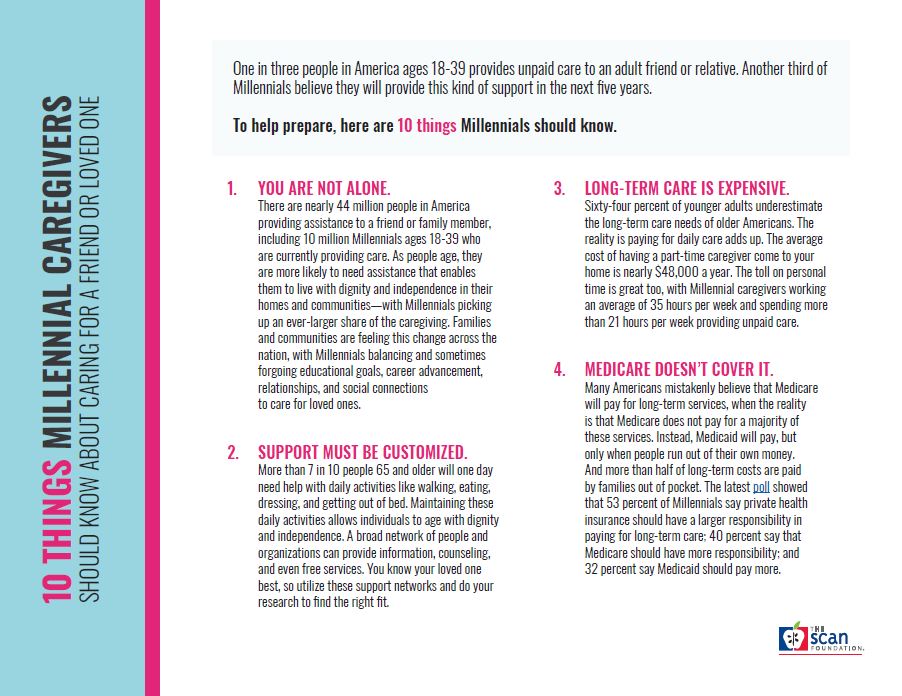10 Things Millennial Caregivers Should Know About Caring for a Friend or Loved One
summary
One in three people in America ages 18-39 provides unpaid care to an adult friend or relative. Another third of millennials believe they will provide this kind of support in the next five years. To help prepare, here are 10 things millennials should know.
Date Updated: 10/02/2018To help prepare, here are 10 things millennials should know.
- You are not alone. There are nearly 44 million people in America providing assistance to a friend or family member, including 10 million millennials ages 18-39 who are currently providing care. As people age, they are more likely to need assistance that enables them to live with dignity and independence in their homes and communities—with millennials picking up an ever-larger share of the caregiving. Families and communities are feeling this change across the nation, with millennials balancing and sometimes forgoing educational goals, career advancement, relationships, and social connections to care for loved ones.
- Support must be customized. More than 7 in 10 people 65 and older will one day need help with daily activities like walking, eating, dressing, and getting out of bed. Maintaining these daily activities allows individuals to age with dignity and independence. A broad network of people and organizations can provide information, counseling, and even free services. You know your loved one best, so utilize these support networks and do your research to find the right fit. One in three people in America ages 18-39 provides unpaid care to an adult friend or relative. Another third of millennials believe they will provide this kind of support in the next five years. To help prepare, here are 10 things millennials should know.
- Long-term care is expensive. Sixty-four percent of younger adults underestimate the long-term care needs of older Americans. The reality is paying for daily care adds up. The average cost of having a part-time caregiver come to your home is nearly $48,000 a year. The toll on personal time is great too, with millennial caregivers working an average of 35 hours per week and spending more than 21 hours per week providing unpaid care…
One in three people in America ages 18-39 provides unpaid care to an adult friend or relative. Another third of millennials believe they will provide this kind of support in the next five years.
Download the publication for all visuals and complete references.
Continue Reading
The Money Follows the Person (MFP) demonstration program represents a major initiative to give people needing long-term services and supports (LTSS) more choice about where they live and receive care, and to increase the capacity of state long-term care systems to serve people in the community rather than in institutions. The MFP demonstration grew in 2011, from 31 to 44 state grantees, when 13 additional states were awarded MFP grants.
Someone turning age 65 today has almost a 70 percent chance of needing some type of long-term care (LTC) in their remaining years. Woman need care longer (3.7 years) than men (2.2 years) and while one-third of today’s 65-year-olds may never need LTC, 20 percent (1 in 5) will need it for longer than five years. To better prepare, here are 10 things to know if you are providing help to an older loved one.
Having regular conversations with your doctor is an important component of aging with dignity and independence. This guide describes important conversations to have with your doctor to prepare for changing health needs as you grow older.


